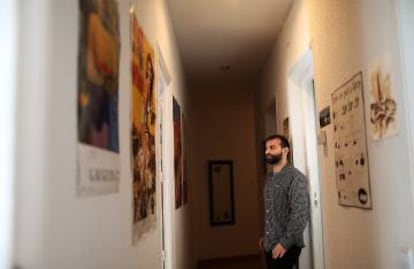Is Madrid headed for the same tourism trap as Barcelona?
Downtown residents are being priced out of their homes, which are turned into tourist apartments

Lucas Hern¨¢ndez used to live in a pretty two-bedroom apartment in the central Malasa?a district of Madrid. He was paying €900 a month for the 100-square-meter space, and planned to stay there for quite a while. But after three years, the legal minimum period after which the owner can rescind the lease, he had to leave.
The reason: the propietor wanted to sell the property. In 2015, a construction company called Aleppo Castilian bought the building and turned the units into tourist apartments. The price per square meter tripled. Hern¨¢ndez, like his other neighbors joined an exodus from the center of the Spanish capital.
These days, to spend one night in what used to be his home would cost Lucas close to €100. And this is just one example of how the city center is being turned over to tourism, in what constitutes an accelerated form of gentifrication.
The treated us as though we were bugs
Alberto Haj-Saleh, resident
More and more residential apartments are being transformed into occasional accommodation, forcing long-term residents out into the suburbs as they are suddenly priced out of their own homes. Rents in Madrid are hitting historical highs: in just one year, they have risen by 14.6%, according to the Bank of Spain. Renting an apartment in the center of the city now costs an average €16.9 per square meter a month.
Over the past decade, the center of Madrid has lost 10% of its population, while in the last two years the number of tourist-oriented accommodation has grown by 50% (from 4,000 housing units to over 6,000), according to a study by the Madrid Higher Technical School of Engineering.
¡°We are not like Barcelona yet, but we are getting there in leaps and bounds,¡± warns ?lvaro Ardura, one of the main researchers in the study.
The document explores the consequences of unbridled tourism and the transformation of city centers, which are emptied of local residents and small businesses and replaced with chain stores.

Madrid shattered its own tourist record in 2015 with more than nine million visitors, beating even Barcelona. And last year, for the first time the Spanish capital had more foreign tourists than Spanish visitors.
But ??igo Henr¨ªquez de Luna, the deputy spokesman for the conservative Popular Party (PP) at Madrid City Council, does not believe this is a problem: ¡°It creates wealth and jobs and renovates rundown areas.¡±
The city¡¯s department of urban planning, which is controlled by the leftist coalition Ahora Madrid, claims that many of those jobs are seasonal and that new businesses do not create wealth in the long term.
In the meantime, more people are being forced out of their homes: property developer Urbania recently bought three buildings in the heart of the city center. In one of them, residents of the 25 housing units were told to vacate the premises, with no possibility of extending the deadline.
Until now, licenses for tourism use have been granted without oversight.?
Jorge Garc¨ªa Casta?o, councilor
¡°They treated us as though we were bugs,¡± says Alberto Haj-Saleh, 39, whose partner has suffered anxiety attacks as a result of the notice. ¡°They want to kick us out of a neighborhood where we have deep roots that go back many years and sell it to the highest bidder.¡±
Jos¨¦ Manuel Calvo, the chief of urban planning at Madrid City Hall, says that ¡°Madrid has always been a welcoming place; visitors are not the problem. But we have to prevent the city from losing its identity, and that means ensuring that residents remain in the center.¡±
¡°Tourism is concentrated, whereas in other capitals it is diversified. The city wants to decentralize it, and get tourists to know other parts of the city,¡± says Calvo. That is the reason why the summer festival Veranos de la Villa scattered events throughout Madrid last year. The goal is to create a city with many different centers, although the first and most important step is to regulate tourist apartments in order to contain the rise in real estate prices.
¡°That falls to the regional government of Madrid; we have asked for some devolved powers on this issue, as other cities have done,¡± explains Jorge Garc¨ªa Casta?o, the councilor representing the Centro district. Casta?o mentions Amsterdam, a city that has a 60-day limit on tourist apartment rentals.
City authorities do have the power to regulate what use the city¡¯s buildings may be put to. ¡°Until now, licenses for tourism use have been granted without much oversight. But that¡¯s something we¡¯re going to start limiting,¡± says Casta?o.
The head of the regional tourism department, Carlos Chaguaceda, says an attempt was made to impose a minimum legal rental period of five days, but that the courts ¡°shot down that project in June.¡± Chaguaceda believes that a national framework is required to make a difference between people who want to let their property out occasionally and developers moving in wholesale, and also to figure out what to do about homesharing websites like como AirBnB ¡°without demonizing tourism¡± in the process.
English version by Susana Urra.
Tu suscripci¨®n se est¨¢ usando en otro dispositivo
?Quieres a?adir otro usuario a tu suscripci¨®n?
Si contin¨²as leyendo en este dispositivo, no se podr¨¢ leer en el otro.
FlechaTu suscripci¨®n se est¨¢ usando en otro dispositivo y solo puedes acceder a EL PA?S desde un dispositivo a la vez.
Si quieres compartir tu cuenta, cambia tu suscripci¨®n a la modalidad Premium, as¨ª podr¨¢s a?adir otro usuario. Cada uno acceder¨¢ con su propia cuenta de email, lo que os permitir¨¢ personalizar vuestra experiencia en EL PA?S.
?Tienes una suscripci¨®n de empresa? Accede aqu¨ª para contratar m¨¢s cuentas.
En el caso de no saber qui¨¦n est¨¢ usando tu cuenta, te recomendamos cambiar tu contrase?a aqu¨ª.
Si decides continuar compartiendo tu cuenta, este mensaje se mostrar¨¢ en tu dispositivo y en el de la otra persona que est¨¢ usando tu cuenta de forma indefinida, afectando a tu experiencia de lectura. Puedes consultar aqu¨ª los t¨¦rminos y condiciones de la suscripci¨®n digital.










































